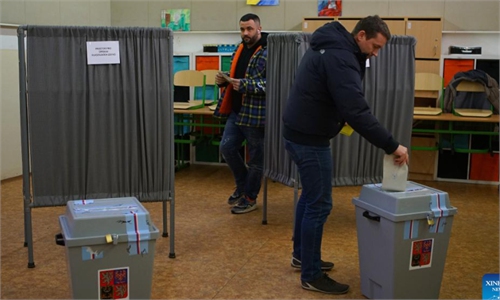Allowing collusion with secessionists 'not in interests of Europe,' experts warn, as Taiwan regional officials set off for Europe

Prague, capital of Czech Republic Photo: Xinhua
The series of visits to Europe by Taiwan regional officials, including the head of its external affairs authority leader Joseph Wu, reflects the anxiety of DPP authorities to seek more "international space." However, by allowing collusion with the Taiwan secessionists, Europe will only end up shooting itself in the foot, experts warned on Monday.
Joseph Wu will visit the Czech Republic in mid-June at the invitation of Czech think tank European Values Center for Security Policy (EVC), and will make a public speech while attending the European Values Summit 2023, the Taiwan local external affairs authority announced on Sunday.
Sources close to the matter said that Wu will attend a security conference in Prague on Wednesday and is due to speak immediately after Czech President Petr Pavel, marking a highly unusual occasion, given that European leaders generally do not share the same stage with senior Taiwan regional officials, according to a Reuters report last week.
He is also scheduled to visit Brussels, headquarters of the European Union.
Another senior official from the island, Audrey Tang, head of the regional digital affairs authority, has been visiting the UK since Sunday to attend a number of events for London Tech Week, local media reported. She is scheduled to hold meetings with British officials in science and innovation, as well as business and trade departments in an attempt to deepen cooperation in digital security, industry investment, and application and innovation areas, media reports said.
The series of visits by Taiwan's DPP authorities to Europe has demonstrated the clear goal of expanding its so-called international visibility, as the diplomatic struggle for the DPP authorities has become increasingly intense, Cui Hongjian, director of the Department of European Studies at the China Institute of International Studies, told the Global Times on Monday.
As a result, Europe has become the main target for the DPP authorities in recent years, Cui said, as they spare no effort to win support from European countries by using the pandemic and now the Ukraine crisis as leverage.
As for European politicians who collude with the DPP secessionists, one of their goals is to use the "Taiwan card" to gain political benefits domestically and appease the US, while hoping to "mobilize" China by playing this "card," so as to better "bargain" with China in economy and trade and other areas, Cui noted.
The change in the Czech Republic's attitude toward the Taiwan question stems from changes in its domestic political landscape, as the country now has a multi-party coalition government, and some of its politicians have always been provoking China.
In addition, as some countries have practical interests in Taiwan's semiconductor industry, they hope to attract the island's investment or participation in its industrial layout.
Some Central and Eastern European countries have become particularly keen to show support for Taiwan secessionists. However, the majority of Europeans would want to remain neutral in any conflict between China and the US over the Taiwan question, according to a recent survey by the European Council on Foreign Relations.
The opinion poll conducted in April across 11 EU member states showed that if a conflict does break out between the two world powers over the Taiwan question, only about one-quarter would want their country, or Europe, to take America's side.
Whether it is to cater to the US, or for their personal interests, these politicians should think twice before they risk losing their relations with China and the benefits they can gain from cooperating with China. Otherwise, they will only end up shooting themselves in the foot, experts warned.

